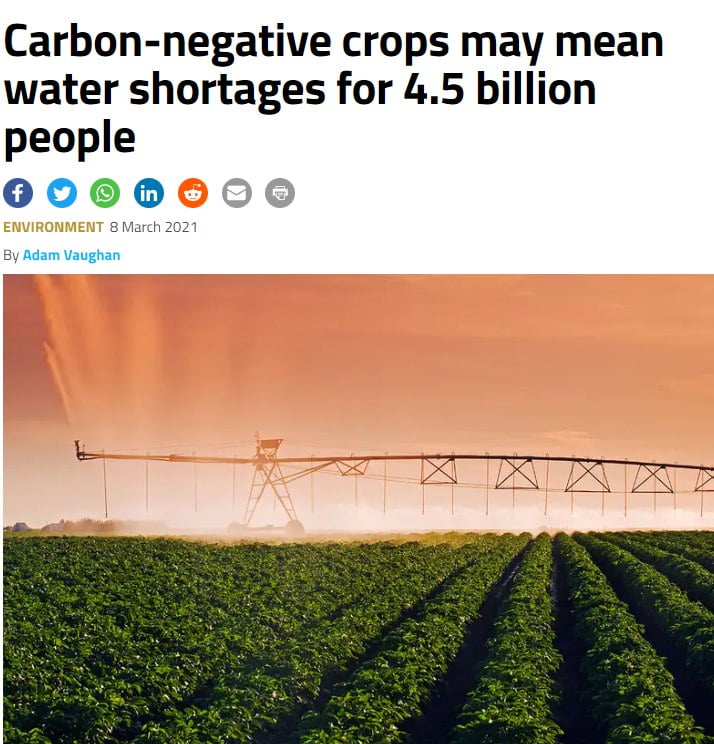According to a study at the Potsdam Institute for Climate Impact Research in Germany done by Fabian Stenzel and his colleagues “the idea of growing[carbon-negative energy] crops and trees to absorb CO2 and capturing the carbon released when they are burned for energy” which is “a central plank to most of the intergovernmental panel on climate change’s scenarios”[1] could prove a cure worse than the disease at least when it comes to water stress.
This technology known as bioenergy with carbon capture and storage (BECCS) could prove to be worse than what the governments depict it to be.
According to Fabian Stenzel of Germany’s Potsdam Institute for Climate Impact Research and his colleagues the water required to irrigate enough energy crops to stay within the 1.5°C limit would result in 4.58 billion people experiencing high water stress by 2100 up from 2.28 billion today. That is 300 million more people than if BECCS is not used at scale and warming spirals to a disastrous 3°C.
According to research if the world opts for a massive expansion in growing energy crops to combat climate change billions more people may face water scarcity. The analysis discovered that high water stress defined as a ratio of water demand to supply greater than 40% would spread to previously unstressed parts of the world due to the need for new BECCS crop plantations. Both South America and southern Africa would be severely impacted.
The 4.58 billion affected people are based on a total of 6 million square kilometers of crops grown for BECCS limited use of sustainable water and a global population of 9 billion by 2100.
Previous research[2]has warned that BECCS’s ability to reduce emissions may be limited due to the vast amount of land required which would have an impact on food production and biodiversity.
The research of Stenzel and his colleagues suggests that BECCS should play a smaller role in how we remove emissions from the atmosphere than the central role envisioned by some. Stenzel believes BECCS will be required in the future but only as one of a number of approaches including biomass combustion to produce charcoal for soil[3] reforestation[4] direct air capture[5] and others.
“Peter Smith at the University of Aberdeen UK says: “This is another warning that we cannot rely on BECCS at the scale of hundreds of millions of hectares as this has adverse consequences for water. The more we reduce emissions now the less we will need to rely on negative-emission technologies like BECCS in the future.””
Since this research proves that such a solution of carbon-negative energy crops which the governments are coming up with in order to combat climate change does not actually combat climate change but makes it worse and which to add insult to injury will generate a big global water crisis can we start acknowledging the fact that the solutions that they bring up are truly not adequate and are done with ulterior motives to bring about more shortages and a larger crisis which then they will blame humanity for?
[1]https://www.ipcc.ch/site/assets/uploads/sites/2/2019/05/SR15_Chapter2_Low_Res.pdf
[2]https://www.imperial.ac.uk/media/imperial-college/grantham-institute/public/publications/briefing-papers/BECCS-deployment—a-reality-check.pdf
[3]https://www.newscientist.com/article/dn19289-green-machine-dont-burn-plant-waste-bury-it/
[4]https://www.newscientist.com/article/mg24532714-700-how-everyone-decided-trees-will-save-the-planet-and-why-they-wont/
[5]https://us3.campaign-archive.com/?u=6710b48697068ec8e08d69abf&id=c9bb60497d

